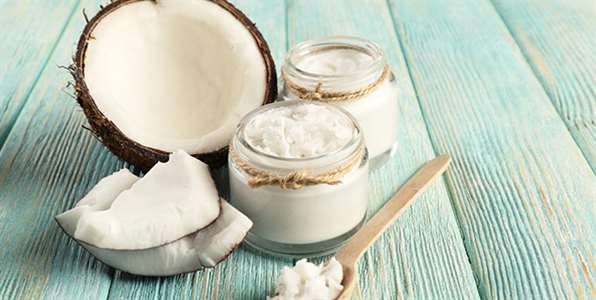
Compared to traditional butters and margarines, coconut oil appears to be an exotic alternative. Its popularity has increased over the years, especially in the health world. With the widespread use of coconut oil, could it be an elixir to healthy, strong hair?
But First, What is Coconut Oil?
Coconut oil is an oil extracted from the white, mature coconut flesh or meat. Coconut oil is a rich fat source, mostly containing saturated fat (3.7 grams) with trace amounts of monounsaturated fat (0.29 grams) and polyunsaturated fat (0.08 grams), per one teaspoon.
Interestingly, saturated fat sources (especially butter and margarines) are generally feared and perceived to increase the risk of heart disease and diabetes. Even more interestingly, more calories from saturated fat are featured in coconut oil (84%) compared to butter (63%).
However, the saturated fat found in coconut oil is mostly made up of medium-chain triglycerides (or MCTs) and maybe easier digested in comparison to long-chain triglycerides (LCTs) found in liquid vegetable oils, dairy, and fatty meats. And though MCT oils may demonstrate a wide variety of internal benefits (improved digesting, strengthened immune system, improved mood, etc.) coconut oil may assist in hair care as well!
Coconut Oil Benefits for Hair
Just like choosing foods to nourish your body's cells, it is equally important to know what is going onto it. Specifically, hair products may contain unwanted, unnatural ingredients. The use of coconut oil for hair is a natural product and voids harsh chemicals and fillers while providing these claimed benefits:
Deep Conditioner
Individuals dealing with damaged hair generally turn to a deep conditioner to nourish it back to life. Research has shown coconut oil reduces protein loss in both damaged and undamaged hair. More interestingly, though, the results were compared to mineral oil and sunflower oil, oils commonly found in hair products. Researchers suggest the reduction in protein loss is related to coconut oil's composition, as it is able to penetrate the hair shaft.
Hair Growth
Running parallel to coconut oil's ability to penetrate the hair shaft, it can also penetrate the hair follicle. Though hair growth is mostly altered based on dietary protein and other nutrients, coconut oil may compliment and speed up the process.
Detangles Hair
Trying to comb out knots can be extremely harmful to the hair, with pressure pulling on the follicle and force tugging on the strands. Instead of trying to tackle the hair knots, soak with coconut oil and comb through. It may be best to comb while wet then rinsing out the oil once the knots have been removed.
Dandruff Beater
The conditioning properties of coconut oil keeps not only the hair strands nourished, but the scalp moisturized as well. A hydrated scalp reduces the chance for flaking and pesky dandruff. If dealing with an existing oily scalp, apply a lighter layer of coconut oil and rinse thoroughly.
How to Use Coconut Oil in Hair
1. Heating
First off, coconut oil should not be directly heated in the microwave. Doing so can reduce and compromise the oil's quality. Instead, place a cup of hot water into a small bowl. In a smaller cup (one that would fit into the small bowl), add a tablespoon or two of coconut oil. Place the small cup with the oil into the larger bowl filled with hot water. The heat will naturally start to melt the oil into a more liquid consistency.
2. Coating
Once melted, massage the oil onto dry or damp hair and onto the scalp. However, the oil spreads more easily on damp hair. After the scalp and hair strands have been coated, comb the hair to evenly distribute the oil.
3. Setting
Allow the oil to set and nourish the hair. Use a shower cup to fully harness the scalp and all saturated hair strands, keeping oil stationary and off of clothes, pillows, etc. Let sit for 30 minutes or throughout the night.
4. Rinsing
After preferred set time is accomplished, rinse out the coconut oil. Do so by shampooing and repeating as necessary to ensure all oil has been removed. Warm water can further assist in rinsing out the oil.
Coconut oil can also be used as a quick treatment or as a detangler. Regardless of the length of time on hair, be sure to rinse out the coconut oil completely. Incomplete removal can unfortunately create an undesirable residue and leave hair strands feeling heavy. With appropriate use, coconut oil can be a completely natural and beneficial hair product!
References:
National Nutrient Database. United States Department of Agriculture. Available at: https://ndb.nal.usda.gov/ndb/foods.
Rele AS, Mohile RB. Effect of mineral oil, sunflower oil, and coconut oil on prevention of hair damage. Journal of Cosmetic Science. 2003 Mar-Apr;54(2):175-92.







